CNA341 Improving Health and Nursing Practice through Translational Research
VerifiedAdded on 2021/09/16
|8
|2163
|102
AI Summary
Contribute Materials
Your contribution can guide someone’s learning journey. Share your
documents today.

Running head: CAN 341
Bowel Cancer
Name of the Student
Name of the University
Author Note
Bowel Cancer
Name of the Student
Name of the University
Author Note
Secure Best Marks with AI Grader
Need help grading? Try our AI Grader for instant feedback on your assignments.
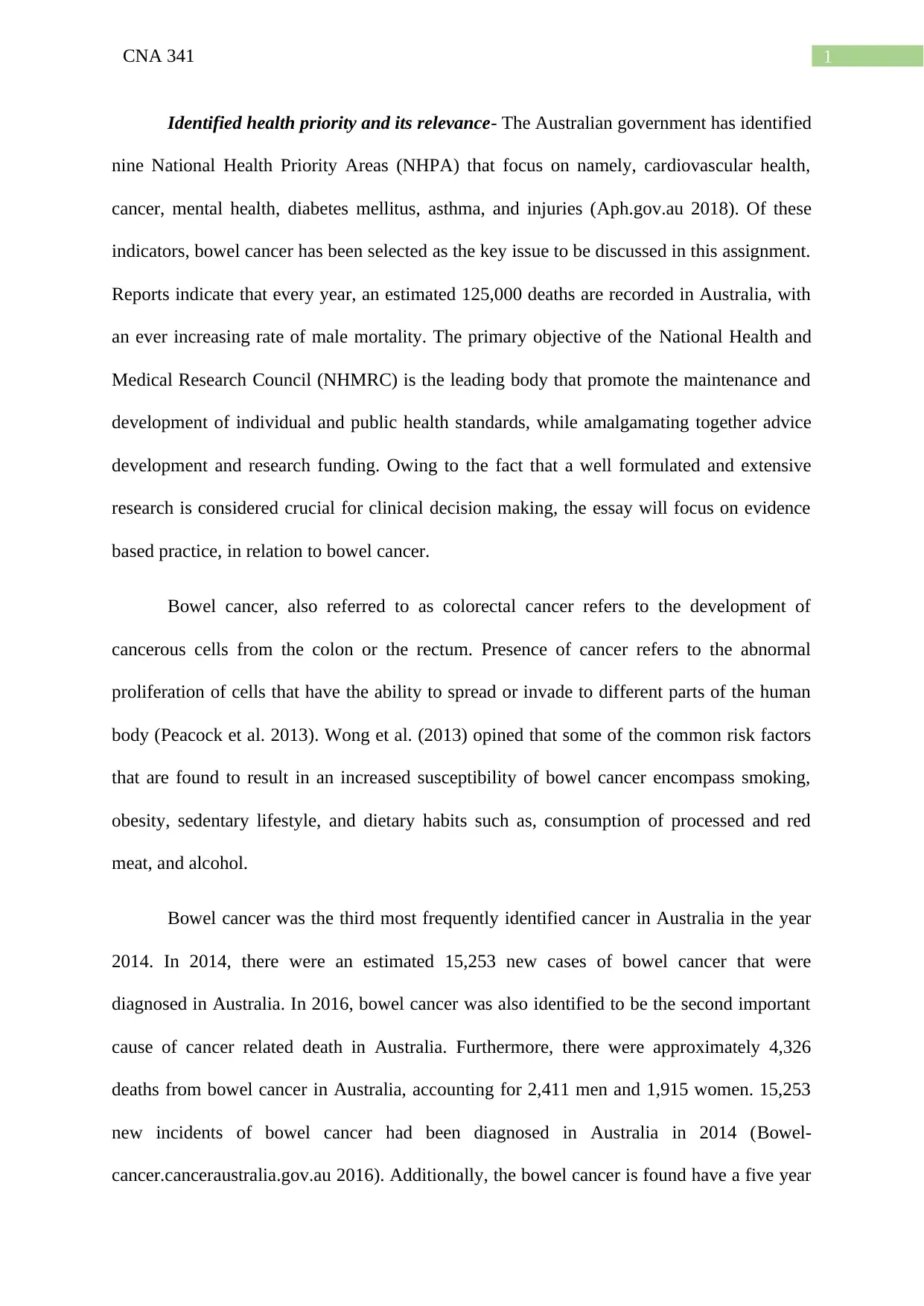
1CNA 341
Identified health priority and its relevance- The Australian government has identified
nine National Health Priority Areas (NHPA) that focus on namely, cardiovascular health,
cancer, mental health, diabetes mellitus, asthma, and injuries (Aph.gov.au 2018). Of these
indicators, bowel cancer has been selected as the key issue to be discussed in this assignment.
Reports indicate that every year, an estimated 125,000 deaths are recorded in Australia, with
an ever increasing rate of male mortality. The primary objective of the National Health and
Medical Research Council (NHMRC) is the leading body that promote the maintenance and
development of individual and public health standards, while amalgamating together advice
development and research funding. Owing to the fact that a well formulated and extensive
research is considered crucial for clinical decision making, the essay will focus on evidence
based practice, in relation to bowel cancer.
Bowel cancer, also referred to as colorectal cancer refers to the development of
cancerous cells from the colon or the rectum. Presence of cancer refers to the abnormal
proliferation of cells that have the ability to spread or invade to different parts of the human
body (Peacock et al. 2013). Wong et al. (2013) opined that some of the common risk factors
that are found to result in an increased susceptibility of bowel cancer encompass smoking,
obesity, sedentary lifestyle, and dietary habits such as, consumption of processed and red
meat, and alcohol.
Bowel cancer was the third most frequently identified cancer in Australia in the year
2014. In 2014, there were an estimated 15,253 new cases of bowel cancer that were
diagnosed in Australia. In 2016, bowel cancer was also identified to be the second important
cause of cancer related death in Australia. Furthermore, there were approximately 4,326
deaths from bowel cancer in Australia, accounting for 2,411 men and 1,915 women. 15,253
new incidents of bowel cancer had been diagnosed in Australia in 2014 (Bowel-
cancer.canceraustralia.gov.au 2016). Additionally, the bowel cancer is found have a five year
Identified health priority and its relevance- The Australian government has identified
nine National Health Priority Areas (NHPA) that focus on namely, cardiovascular health,
cancer, mental health, diabetes mellitus, asthma, and injuries (Aph.gov.au 2018). Of these
indicators, bowel cancer has been selected as the key issue to be discussed in this assignment.
Reports indicate that every year, an estimated 125,000 deaths are recorded in Australia, with
an ever increasing rate of male mortality. The primary objective of the National Health and
Medical Research Council (NHMRC) is the leading body that promote the maintenance and
development of individual and public health standards, while amalgamating together advice
development and research funding. Owing to the fact that a well formulated and extensive
research is considered crucial for clinical decision making, the essay will focus on evidence
based practice, in relation to bowel cancer.
Bowel cancer, also referred to as colorectal cancer refers to the development of
cancerous cells from the colon or the rectum. Presence of cancer refers to the abnormal
proliferation of cells that have the ability to spread or invade to different parts of the human
body (Peacock et al. 2013). Wong et al. (2013) opined that some of the common risk factors
that are found to result in an increased susceptibility of bowel cancer encompass smoking,
obesity, sedentary lifestyle, and dietary habits such as, consumption of processed and red
meat, and alcohol.
Bowel cancer was the third most frequently identified cancer in Australia in the year
2014. In 2014, there were an estimated 15,253 new cases of bowel cancer that were
diagnosed in Australia. In 2016, bowel cancer was also identified to be the second important
cause of cancer related death in Australia. Furthermore, there were approximately 4,326
deaths from bowel cancer in Australia, accounting for 2,411 men and 1,915 women. 15,253
new incidents of bowel cancer had been diagnosed in Australia in 2014 (Bowel-
cancer.canceraustralia.gov.au 2016). Additionally, the bowel cancer is found have a five year
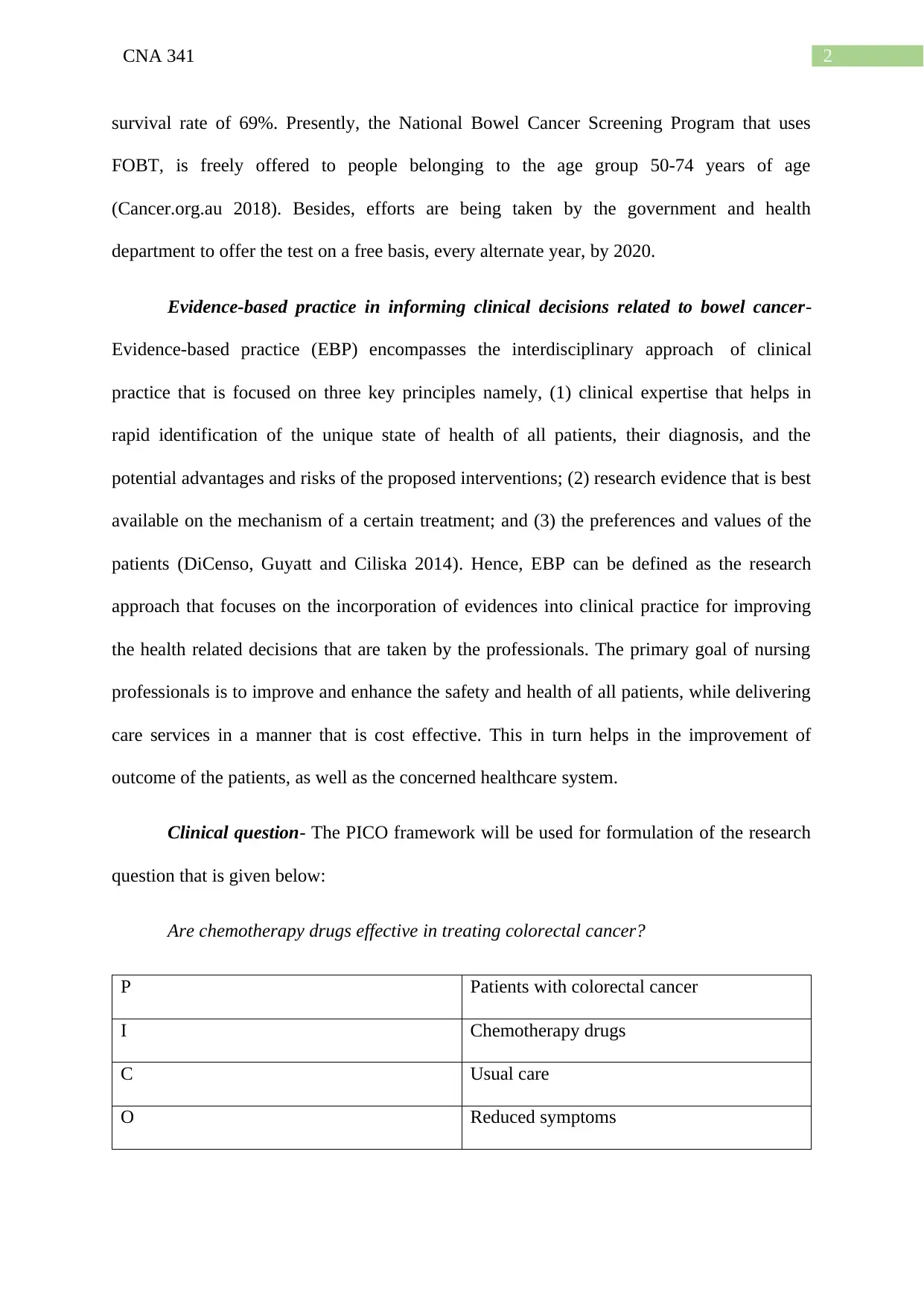
2CNA 341
survival rate of 69%. Presently, the National Bowel Cancer Screening Program that uses
FOBT, is freely offered to people belonging to the age group 50-74 years of age
(Cancer.org.au 2018). Besides, efforts are being taken by the government and health
department to offer the test on a free basis, every alternate year, by 2020.
Evidence-based practice in informing clinical decisions related to bowel cancer-
Evidence-based practice (EBP) encompasses the interdisciplinary approach of clinical
practice that is focused on three key principles namely, (1) clinical expertise that helps in
rapid identification of the unique state of health of all patients, their diagnosis, and the
potential advantages and risks of the proposed interventions; (2) research evidence that is best
available on the mechanism of a certain treatment; and (3) the preferences and values of the
patients (DiCenso, Guyatt and Ciliska 2014). Hence, EBP can be defined as the research
approach that focuses on the incorporation of evidences into clinical practice for improving
the health related decisions that are taken by the professionals. The primary goal of nursing
professionals is to improve and enhance the safety and health of all patients, while delivering
care services in a manner that is cost effective. This in turn helps in the improvement of
outcome of the patients, as well as the concerned healthcare system.
Clinical question- The PICO framework will be used for formulation of the research
question that is given below:
Are chemotherapy drugs effective in treating colorectal cancer?
P Patients with colorectal cancer
I Chemotherapy drugs
C Usual care
O Reduced symptoms
survival rate of 69%. Presently, the National Bowel Cancer Screening Program that uses
FOBT, is freely offered to people belonging to the age group 50-74 years of age
(Cancer.org.au 2018). Besides, efforts are being taken by the government and health
department to offer the test on a free basis, every alternate year, by 2020.
Evidence-based practice in informing clinical decisions related to bowel cancer-
Evidence-based practice (EBP) encompasses the interdisciplinary approach of clinical
practice that is focused on three key principles namely, (1) clinical expertise that helps in
rapid identification of the unique state of health of all patients, their diagnosis, and the
potential advantages and risks of the proposed interventions; (2) research evidence that is best
available on the mechanism of a certain treatment; and (3) the preferences and values of the
patients (DiCenso, Guyatt and Ciliska 2014). Hence, EBP can be defined as the research
approach that focuses on the incorporation of evidences into clinical practice for improving
the health related decisions that are taken by the professionals. The primary goal of nursing
professionals is to improve and enhance the safety and health of all patients, while delivering
care services in a manner that is cost effective. This in turn helps in the improvement of
outcome of the patients, as well as the concerned healthcare system.
Clinical question- The PICO framework will be used for formulation of the research
question that is given below:
Are chemotherapy drugs effective in treating colorectal cancer?
P Patients with colorectal cancer
I Chemotherapy drugs
C Usual care
O Reduced symptoms
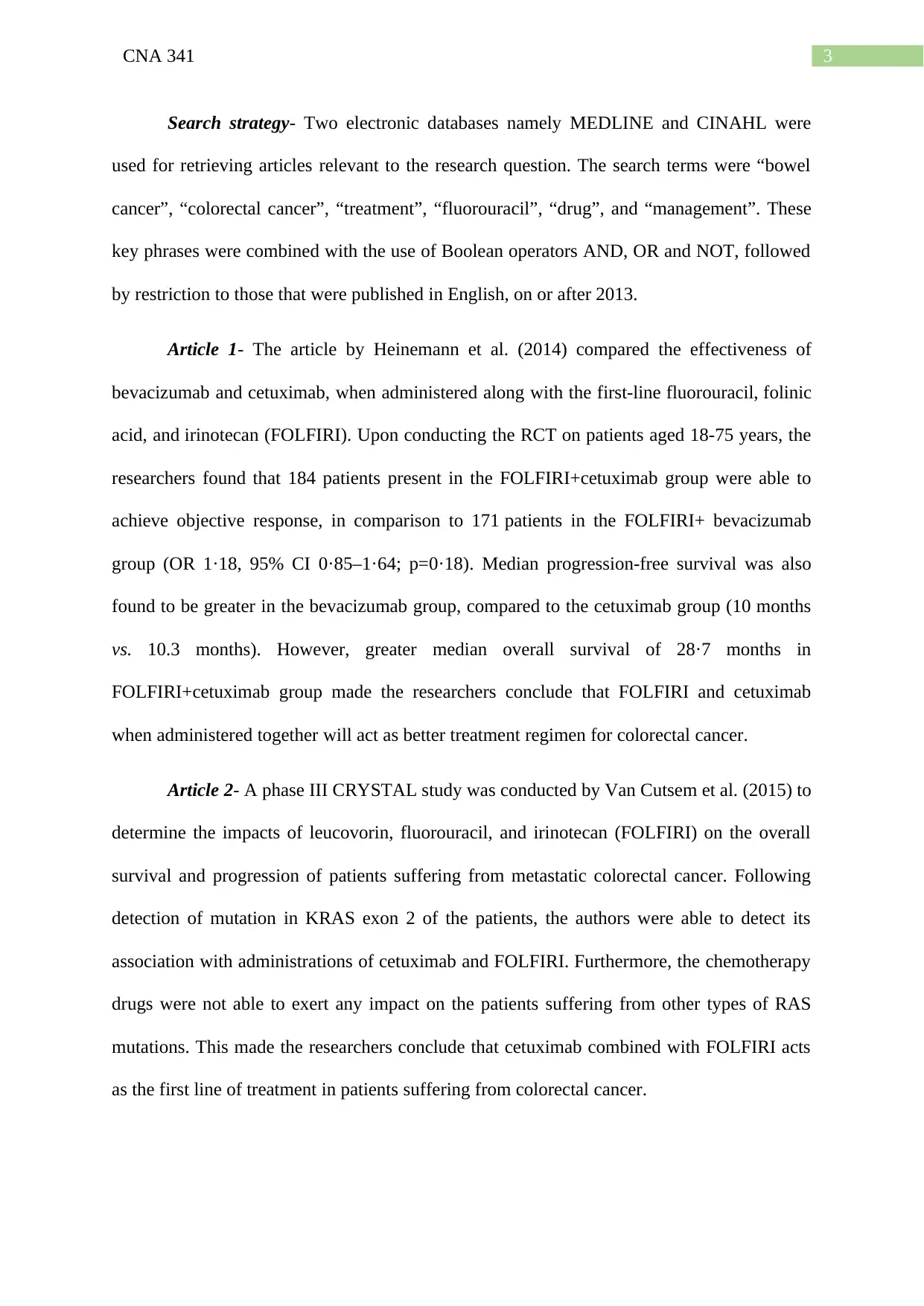
3CNA 341
Search strategy- Two electronic databases namely MEDLINE and CINAHL were
used for retrieving articles relevant to the research question. The search terms were “bowel
cancer”, “colorectal cancer”, “treatment”, “fluorouracil”, “drug”, and “management”. These
key phrases were combined with the use of Boolean operators AND, OR and NOT, followed
by restriction to those that were published in English, on or after 2013.
Article 1- The article by Heinemann et al. (2014) compared the effectiveness of
bevacizumab and cetuximab, when administered along with the first-line fluorouracil, folinic
acid, and irinotecan (FOLFIRI). Upon conducting the RCT on patients aged 18-75 years, the
researchers found that 184 patients present in the FOLFIRI+cetuximab group were able to
achieve objective response, in comparison to 171 patients in the FOLFIRI+ bevacizumab
group (OR 1·18, 95% CI 0·85–1·64; p=0·18). Median progression-free survival was also
found to be greater in the bevacizumab group, compared to the cetuximab group (10 months
vs. 10.3 months). However, greater median overall survival of 28·7 months in
FOLFIRI+cetuximab group made the researchers conclude that FOLFIRI and cetuximab
when administered together will act as better treatment regimen for colorectal cancer.
Article 2- A phase III CRYSTAL study was conducted by Van Cutsem et al. (2015) to
determine the impacts of leucovorin, fluorouracil, and irinotecan (FOLFIRI) on the overall
survival and progression of patients suffering from metastatic colorectal cancer. Following
detection of mutation in KRAS exon 2 of the patients, the authors were able to detect its
association with administrations of cetuximab and FOLFIRI. Furthermore, the chemotherapy
drugs were not able to exert any impact on the patients suffering from other types of RAS
mutations. This made the researchers conclude that cetuximab combined with FOLFIRI acts
as the first line of treatment in patients suffering from colorectal cancer.
Search strategy- Two electronic databases namely MEDLINE and CINAHL were
used for retrieving articles relevant to the research question. The search terms were “bowel
cancer”, “colorectal cancer”, “treatment”, “fluorouracil”, “drug”, and “management”. These
key phrases were combined with the use of Boolean operators AND, OR and NOT, followed
by restriction to those that were published in English, on or after 2013.
Article 1- The article by Heinemann et al. (2014) compared the effectiveness of
bevacizumab and cetuximab, when administered along with the first-line fluorouracil, folinic
acid, and irinotecan (FOLFIRI). Upon conducting the RCT on patients aged 18-75 years, the
researchers found that 184 patients present in the FOLFIRI+cetuximab group were able to
achieve objective response, in comparison to 171 patients in the FOLFIRI+ bevacizumab
group (OR 1·18, 95% CI 0·85–1·64; p=0·18). Median progression-free survival was also
found to be greater in the bevacizumab group, compared to the cetuximab group (10 months
vs. 10.3 months). However, greater median overall survival of 28·7 months in
FOLFIRI+cetuximab group made the researchers conclude that FOLFIRI and cetuximab
when administered together will act as better treatment regimen for colorectal cancer.
Article 2- A phase III CRYSTAL study was conducted by Van Cutsem et al. (2015) to
determine the impacts of leucovorin, fluorouracil, and irinotecan (FOLFIRI) on the overall
survival and progression of patients suffering from metastatic colorectal cancer. Following
detection of mutation in KRAS exon 2 of the patients, the authors were able to detect its
association with administrations of cetuximab and FOLFIRI. Furthermore, the chemotherapy
drugs were not able to exert any impact on the patients suffering from other types of RAS
mutations. This made the researchers conclude that cetuximab combined with FOLFIRI acts
as the first line of treatment in patients suffering from colorectal cancer.
Secure Best Marks with AI Grader
Need help grading? Try our AI Grader for instant feedback on your assignments.
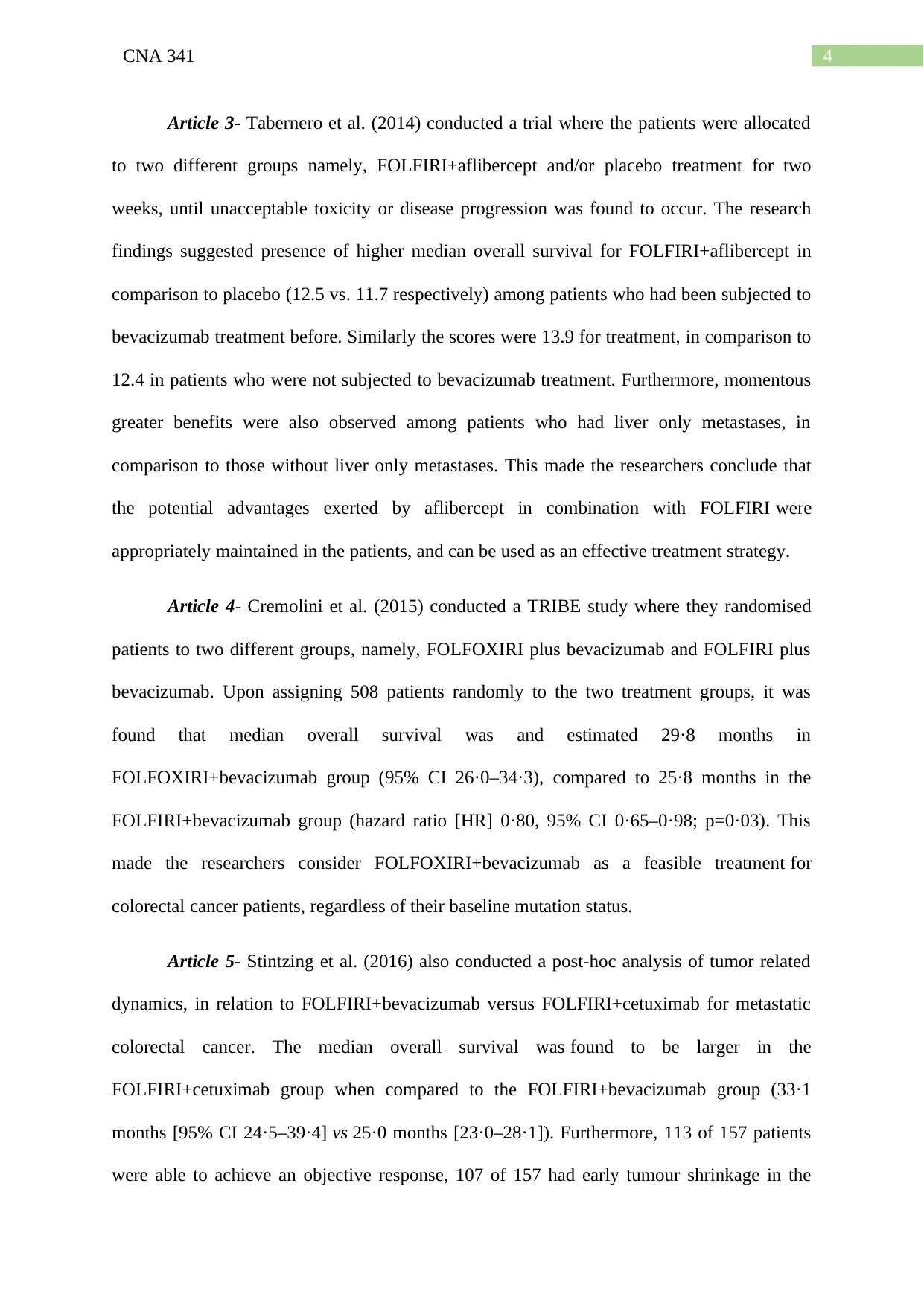
4CNA 341
Article 3- Tabernero et al. (2014) conducted a trial where the patients were allocated
to two different groups namely, FOLFIRI+aflibercept and/or placebo treatment for two
weeks, until unacceptable toxicity or disease progression was found to occur. The research
findings suggested presence of higher median overall survival for FOLFIRI+aflibercept in
comparison to placebo (12.5 vs. 11.7 respectively) among patients who had been subjected to
bevacizumab treatment before. Similarly the scores were 13.9 for treatment, in comparison to
12.4 in patients who were not subjected to bevacizumab treatment. Furthermore, momentous
greater benefits were also observed among patients who had liver only metastases, in
comparison to those without liver only metastases. This made the researchers conclude that
the potential advantages exerted by aflibercept in combination with FOLFIRI were
appropriately maintained in the patients, and can be used as an effective treatment strategy.
Article 4- Cremolini et al. (2015) conducted a TRIBE study where they randomised
patients to two different groups, namely, FOLFOXIRI plus bevacizumab and FOLFIRI plus
bevacizumab. Upon assigning 508 patients randomly to the two treatment groups, it was
found that median overall survival was and estimated 29·8 months in
FOLFOXIRI+bevacizumab group (95% CI 26·0–34·3), compared to 25·8 months in the
FOLFIRI+bevacizumab group (hazard ratio [HR] 0·80, 95% CI 0·65–0·98; p=0·03). This
made the researchers consider FOLFOXIRI+bevacizumab as a feasible treatment for
colorectal cancer patients, regardless of their baseline mutation status.
Article 5- Stintzing et al. (2016) also conducted a post-hoc analysis of tumor related
dynamics, in relation to FOLFIRI+bevacizumab versus FOLFIRI+cetuximab for metastatic
colorectal cancer. The median overall survival was found to be larger in the
FOLFIRI+cetuximab group when compared to the FOLFIRI+bevacizumab group (33·1
months [95% CI 24·5–39·4] vs 25·0 months [23·0–28·1]). Furthermore, 113 of 157 patients
were able to achieve an objective response, 107 of 157 had early tumour shrinkage in the
Article 3- Tabernero et al. (2014) conducted a trial where the patients were allocated
to two different groups namely, FOLFIRI+aflibercept and/or placebo treatment for two
weeks, until unacceptable toxicity or disease progression was found to occur. The research
findings suggested presence of higher median overall survival for FOLFIRI+aflibercept in
comparison to placebo (12.5 vs. 11.7 respectively) among patients who had been subjected to
bevacizumab treatment before. Similarly the scores were 13.9 for treatment, in comparison to
12.4 in patients who were not subjected to bevacizumab treatment. Furthermore, momentous
greater benefits were also observed among patients who had liver only metastases, in
comparison to those without liver only metastases. This made the researchers conclude that
the potential advantages exerted by aflibercept in combination with FOLFIRI were
appropriately maintained in the patients, and can be used as an effective treatment strategy.
Article 4- Cremolini et al. (2015) conducted a TRIBE study where they randomised
patients to two different groups, namely, FOLFOXIRI plus bevacizumab and FOLFIRI plus
bevacizumab. Upon assigning 508 patients randomly to the two treatment groups, it was
found that median overall survival was and estimated 29·8 months in
FOLFOXIRI+bevacizumab group (95% CI 26·0–34·3), compared to 25·8 months in the
FOLFIRI+bevacizumab group (hazard ratio [HR] 0·80, 95% CI 0·65–0·98; p=0·03). This
made the researchers consider FOLFOXIRI+bevacizumab as a feasible treatment for
colorectal cancer patients, regardless of their baseline mutation status.
Article 5- Stintzing et al. (2016) also conducted a post-hoc analysis of tumor related
dynamics, in relation to FOLFIRI+bevacizumab versus FOLFIRI+cetuximab for metastatic
colorectal cancer. The median overall survival was found to be larger in the
FOLFIRI+cetuximab group when compared to the FOLFIRI+bevacizumab group (33·1
months [95% CI 24·5–39·4] vs 25·0 months [23·0–28·1]). Furthermore, 113 of 157 patients
were able to achieve an objective response, 107 of 157 had early tumour shrinkage in the
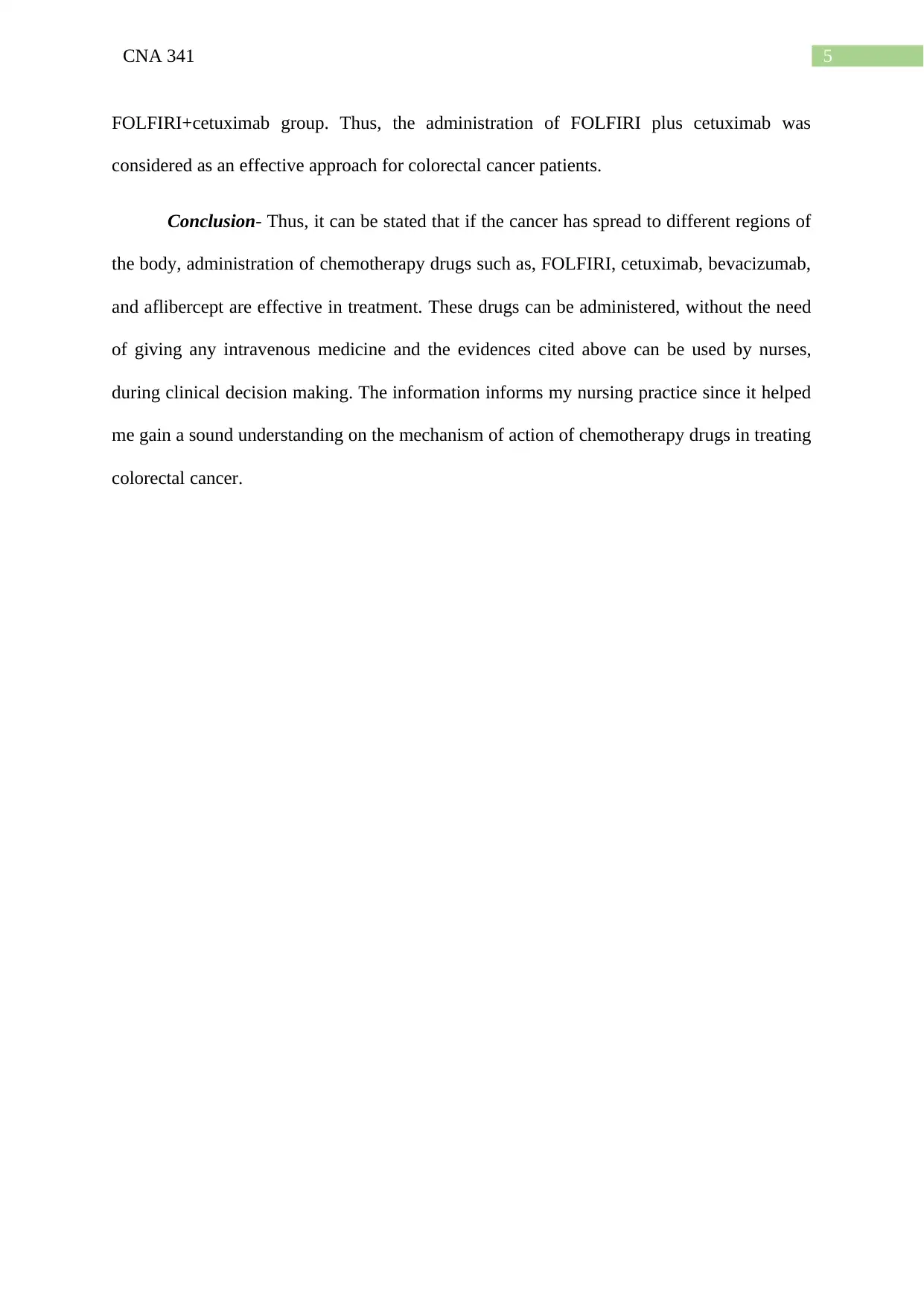
5CNA 341
FOLFIRI+cetuximab group. Thus, the administration of FOLFIRI plus cetuximab was
considered as an effective approach for colorectal cancer patients.
Conclusion- Thus, it can be stated that if the cancer has spread to different regions of
the body, administration of chemotherapy drugs such as, FOLFIRI, cetuximab, bevacizumab,
and aflibercept are effective in treatment. These drugs can be administered, without the need
of giving any intravenous medicine and the evidences cited above can be used by nurses,
during clinical decision making. The information informs my nursing practice since it helped
me gain a sound understanding on the mechanism of action of chemotherapy drugs in treating
colorectal cancer.
FOLFIRI+cetuximab group. Thus, the administration of FOLFIRI plus cetuximab was
considered as an effective approach for colorectal cancer patients.
Conclusion- Thus, it can be stated that if the cancer has spread to different regions of
the body, administration of chemotherapy drugs such as, FOLFIRI, cetuximab, bevacizumab,
and aflibercept are effective in treatment. These drugs can be administered, without the need
of giving any intravenous medicine and the evidences cited above can be used by nurses,
during clinical decision making. The information informs my nursing practice since it helped
me gain a sound understanding on the mechanism of action of chemotherapy drugs in treating
colorectal cancer.
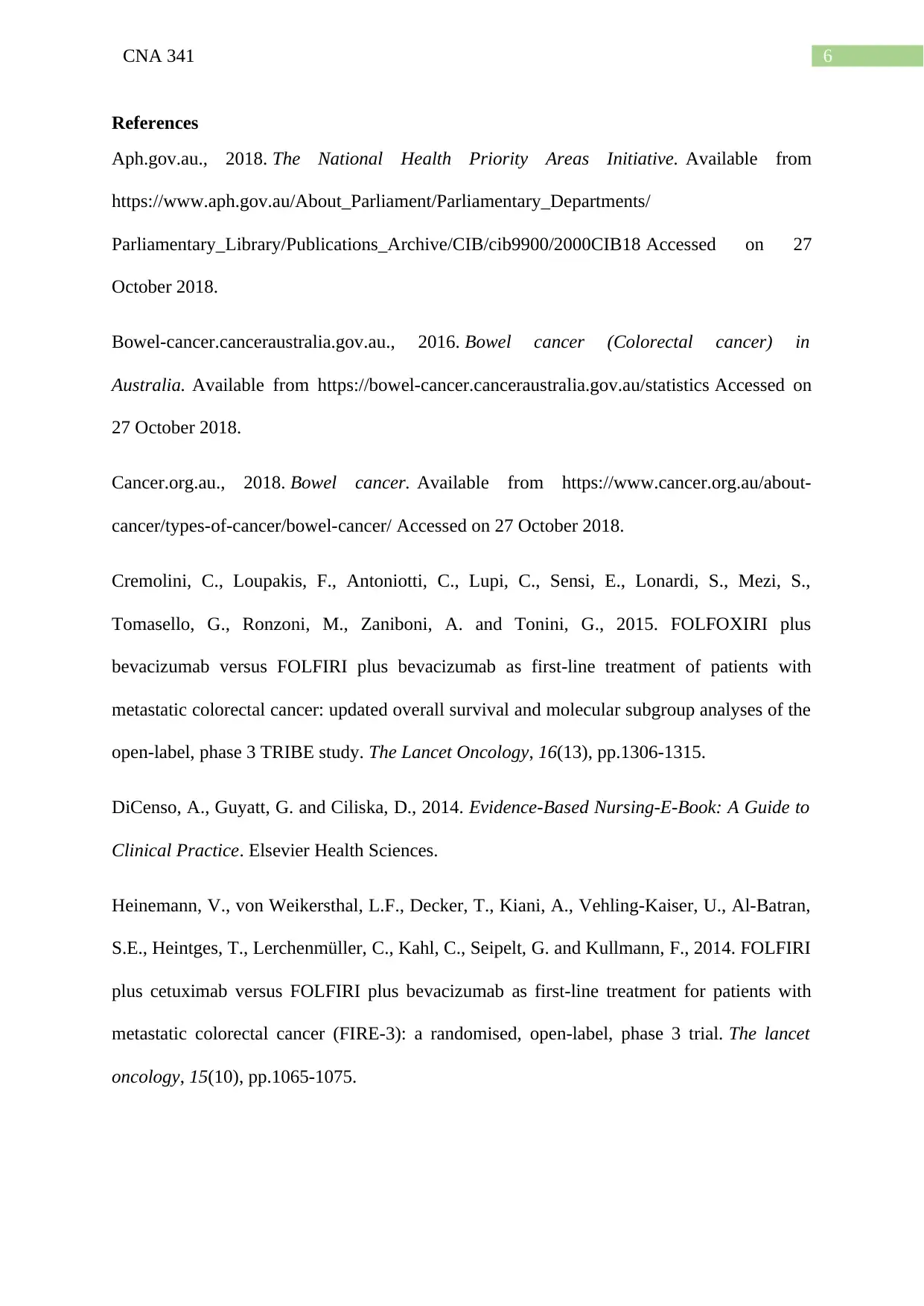
6CNA 341
References
Aph.gov.au., 2018. The National Health Priority Areas Initiative. Available from
https://www.aph.gov.au/About_Parliament/Parliamentary_Departments/
Parliamentary_Library/Publications_Archive/CIB/cib9900/2000CIB18 Accessed on 27
October 2018.
Bowel-cancer.canceraustralia.gov.au., 2016. Bowel cancer (Colorectal cancer) in
Australia. Available from https://bowel-cancer.canceraustralia.gov.au/statistics Accessed on
27 October 2018.
Cancer.org.au., 2018. Bowel cancer. Available from https://www.cancer.org.au/about-
cancer/types-of-cancer/bowel-cancer/ Accessed on 27 October 2018.
Cremolini, C., Loupakis, F., Antoniotti, C., Lupi, C., Sensi, E., Lonardi, S., Mezi, S.,
Tomasello, G., Ronzoni, M., Zaniboni, A. and Tonini, G., 2015. FOLFOXIRI plus
bevacizumab versus FOLFIRI plus bevacizumab as first-line treatment of patients with
metastatic colorectal cancer: updated overall survival and molecular subgroup analyses of the
open-label, phase 3 TRIBE study. The Lancet Oncology, 16(13), pp.1306-1315.
DiCenso, A., Guyatt, G. and Ciliska, D., 2014. Evidence-Based Nursing-E-Book: A Guide to
Clinical Practice. Elsevier Health Sciences.
Heinemann, V., von Weikersthal, L.F., Decker, T., Kiani, A., Vehling-Kaiser, U., Al-Batran,
S.E., Heintges, T., Lerchenmüller, C., Kahl, C., Seipelt, G. and Kullmann, F., 2014. FOLFIRI
plus cetuximab versus FOLFIRI plus bevacizumab as first-line treatment for patients with
metastatic colorectal cancer (FIRE-3): a randomised, open-label, phase 3 trial. The lancet
oncology, 15(10), pp.1065-1075.
References
Aph.gov.au., 2018. The National Health Priority Areas Initiative. Available from
https://www.aph.gov.au/About_Parliament/Parliamentary_Departments/
Parliamentary_Library/Publications_Archive/CIB/cib9900/2000CIB18 Accessed on 27
October 2018.
Bowel-cancer.canceraustralia.gov.au., 2016. Bowel cancer (Colorectal cancer) in
Australia. Available from https://bowel-cancer.canceraustralia.gov.au/statistics Accessed on
27 October 2018.
Cancer.org.au., 2018. Bowel cancer. Available from https://www.cancer.org.au/about-
cancer/types-of-cancer/bowel-cancer/ Accessed on 27 October 2018.
Cremolini, C., Loupakis, F., Antoniotti, C., Lupi, C., Sensi, E., Lonardi, S., Mezi, S.,
Tomasello, G., Ronzoni, M., Zaniboni, A. and Tonini, G., 2015. FOLFOXIRI plus
bevacizumab versus FOLFIRI plus bevacizumab as first-line treatment of patients with
metastatic colorectal cancer: updated overall survival and molecular subgroup analyses of the
open-label, phase 3 TRIBE study. The Lancet Oncology, 16(13), pp.1306-1315.
DiCenso, A., Guyatt, G. and Ciliska, D., 2014. Evidence-Based Nursing-E-Book: A Guide to
Clinical Practice. Elsevier Health Sciences.
Heinemann, V., von Weikersthal, L.F., Decker, T., Kiani, A., Vehling-Kaiser, U., Al-Batran,
S.E., Heintges, T., Lerchenmüller, C., Kahl, C., Seipelt, G. and Kullmann, F., 2014. FOLFIRI
plus cetuximab versus FOLFIRI plus bevacizumab as first-line treatment for patients with
metastatic colorectal cancer (FIRE-3): a randomised, open-label, phase 3 trial. The lancet
oncology, 15(10), pp.1065-1075.
Paraphrase This Document
Need a fresh take? Get an instant paraphrase of this document with our AI Paraphraser
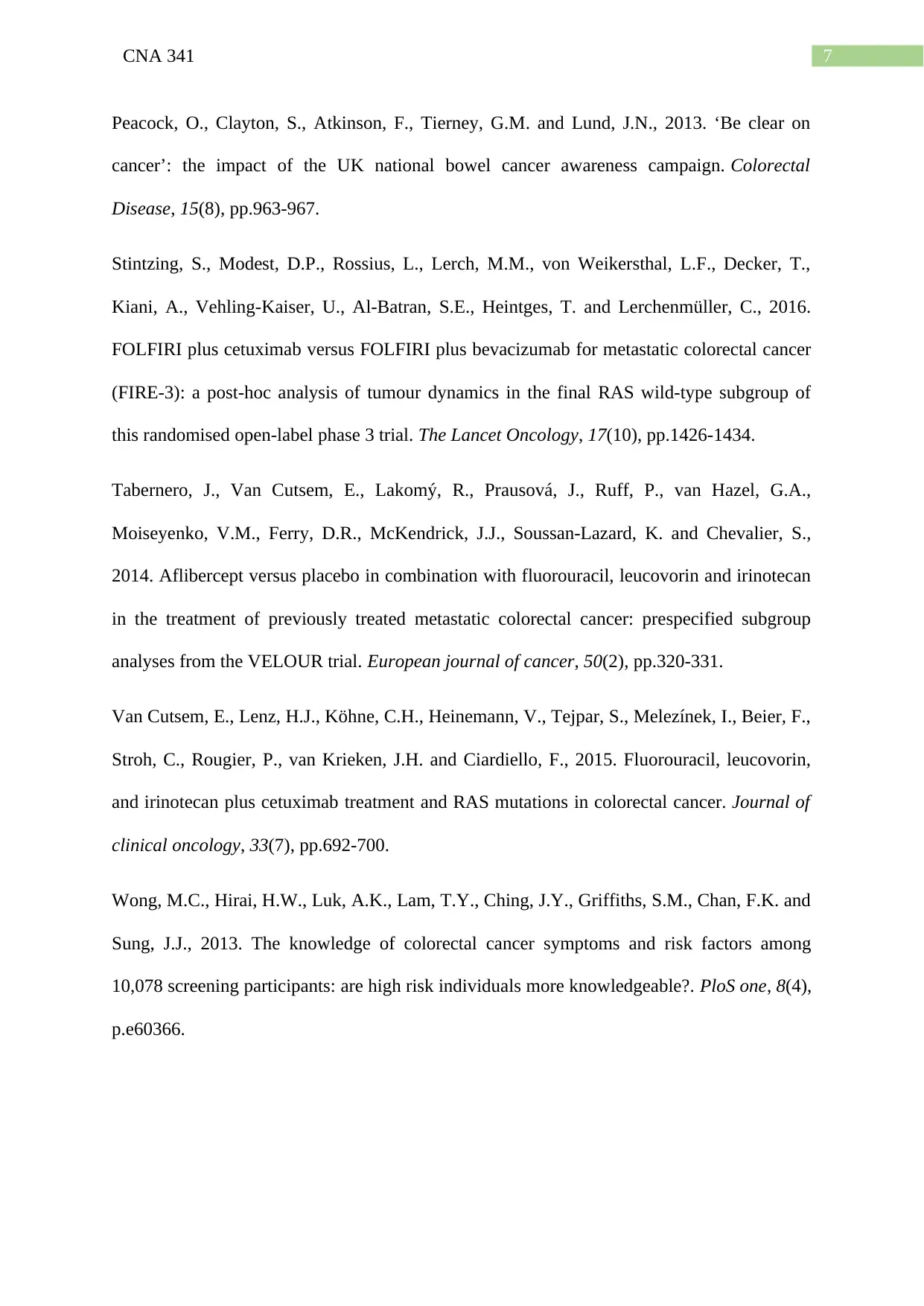
7CNA 341
Peacock, O., Clayton, S., Atkinson, F., Tierney, G.M. and Lund, J.N., 2013. ‘Be clear on
cancer’: the impact of the UK national bowel cancer awareness campaign. Colorectal
Disease, 15(8), pp.963-967.
Stintzing, S., Modest, D.P., Rossius, L., Lerch, M.M., von Weikersthal, L.F., Decker, T.,
Kiani, A., Vehling-Kaiser, U., Al-Batran, S.E., Heintges, T. and Lerchenmüller, C., 2016.
FOLFIRI plus cetuximab versus FOLFIRI plus bevacizumab for metastatic colorectal cancer
(FIRE-3): a post-hoc analysis of tumour dynamics in the final RAS wild-type subgroup of
this randomised open-label phase 3 trial. The Lancet Oncology, 17(10), pp.1426-1434.
Tabernero, J., Van Cutsem, E., Lakomý, R., Prausová, J., Ruff, P., van Hazel, G.A.,
Moiseyenko, V.M., Ferry, D.R., McKendrick, J.J., Soussan-Lazard, K. and Chevalier, S.,
2014. Aflibercept versus placebo in combination with fluorouracil, leucovorin and irinotecan
in the treatment of previously treated metastatic colorectal cancer: prespecified subgroup
analyses from the VELOUR trial. European journal of cancer, 50(2), pp.320-331.
Van Cutsem, E., Lenz, H.J., Köhne, C.H., Heinemann, V., Tejpar, S., Melezínek, I., Beier, F.,
Stroh, C., Rougier, P., van Krieken, J.H. and Ciardiello, F., 2015. Fluorouracil, leucovorin,
and irinotecan plus cetuximab treatment and RAS mutations in colorectal cancer. Journal of
clinical oncology, 33(7), pp.692-700.
Wong, M.C., Hirai, H.W., Luk, A.K., Lam, T.Y., Ching, J.Y., Griffiths, S.M., Chan, F.K. and
Sung, J.J., 2013. The knowledge of colorectal cancer symptoms and risk factors among
10,078 screening participants: are high risk individuals more knowledgeable?. PloS one, 8(4),
p.e60366.
Peacock, O., Clayton, S., Atkinson, F., Tierney, G.M. and Lund, J.N., 2013. ‘Be clear on
cancer’: the impact of the UK national bowel cancer awareness campaign. Colorectal
Disease, 15(8), pp.963-967.
Stintzing, S., Modest, D.P., Rossius, L., Lerch, M.M., von Weikersthal, L.F., Decker, T.,
Kiani, A., Vehling-Kaiser, U., Al-Batran, S.E., Heintges, T. and Lerchenmüller, C., 2016.
FOLFIRI plus cetuximab versus FOLFIRI plus bevacizumab for metastatic colorectal cancer
(FIRE-3): a post-hoc analysis of tumour dynamics in the final RAS wild-type subgroup of
this randomised open-label phase 3 trial. The Lancet Oncology, 17(10), pp.1426-1434.
Tabernero, J., Van Cutsem, E., Lakomý, R., Prausová, J., Ruff, P., van Hazel, G.A.,
Moiseyenko, V.M., Ferry, D.R., McKendrick, J.J., Soussan-Lazard, K. and Chevalier, S.,
2014. Aflibercept versus placebo in combination with fluorouracil, leucovorin and irinotecan
in the treatment of previously treated metastatic colorectal cancer: prespecified subgroup
analyses from the VELOUR trial. European journal of cancer, 50(2), pp.320-331.
Van Cutsem, E., Lenz, H.J., Köhne, C.H., Heinemann, V., Tejpar, S., Melezínek, I., Beier, F.,
Stroh, C., Rougier, P., van Krieken, J.H. and Ciardiello, F., 2015. Fluorouracil, leucovorin,
and irinotecan plus cetuximab treatment and RAS mutations in colorectal cancer. Journal of
clinical oncology, 33(7), pp.692-700.
Wong, M.C., Hirai, H.W., Luk, A.K., Lam, T.Y., Ching, J.Y., Griffiths, S.M., Chan, F.K. and
Sung, J.J., 2013. The knowledge of colorectal cancer symptoms and risk factors among
10,078 screening participants: are high risk individuals more knowledgeable?. PloS one, 8(4),
p.e60366.
1 out of 8
Related Documents
Your All-in-One AI-Powered Toolkit for Academic Success.
+13062052269
info@desklib.com
Available 24*7 on WhatsApp / Email
![[object Object]](/_next/static/media/star-bottom.7253800d.svg)
Unlock your academic potential
© 2024 | Zucol Services PVT LTD | All rights reserved.





